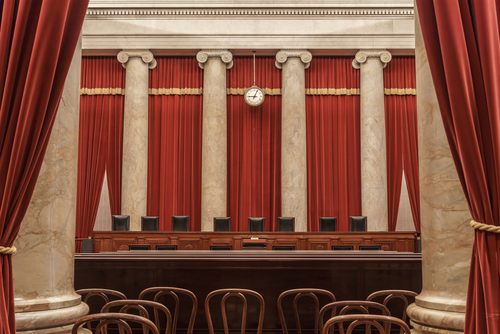SCOTUS rules Arkansas must include names of gay spouses on birth certificates; Gorsuch dissents

U.S. Supreme Court/Shutterstock
The U.S. Supreme Court on Monday ruled that the U.S. Constitution requires the state of Arkansas to list gay spouses on birth certificates.
The per curiam decision (PDF) granted cert and summarily overturned a ruling by the Arkansas Supreme Court. Justice Neil M. Gorsuch dissented, in an opinion joined by Justices Clarence Thomas and Samuel Anthony Alito Jr.
State law in Arkansas generally requires a male spouse to be listed on the birth certificate when a woman gives birth. The Arkansas Supreme Court held the state law does not have to apply to similarly situated same-sex couples.
The case was brought by two married same-sex couples who conceived through artificial insemination. The Arkansas Department of Health had listed only the birth mother’s names on the birth certificates, relying on a state law that refers to the listing of husbands on the certificates.
The Supreme Court said its decision establishing a constitutional right to gay marriage, Obergefell v. Hodges, bars disparate treatment of same-sex couples in issuing birth certificates.
The state had argued its birth certificate law isn’t a benefit of marriage protected by Obergefell. Instead, the state argued, the birth certificate is just a device to record biological parentage.
But the Supreme Court said Arkansas law “makes birth certificates about more than just genetics” because it requires husbands–but not female spouses–to be listed on birth certificates when a child is conceived by artificial insemination.
In his dissent, Gorsuch said summary reversal is usually reserved for cases where the law is settled and stable. “Respectfully, I don’t believe this case meets that standard,” he wrote.
“Nothing in Obergefell indicates that a birth registration regime based on biology, one no doubt with many analogues across the country and throughout history, offends the Constitution,” Gorsuch also wrote.
Even if the concern is about the law’s application in instances of artificial insemination, summary reversal isn’t warranted because of the nature of the legal challenge and the Arkansas Supreme Court decision, Gorsuch said.
The gay couples had challenged the state’s authority to enforce its registration regime, rather than the registration law, and the trial court granted relief. The state supreme court had “simply held that this overbroad remedy wasn’t commanded by Obergefell or the Constitution,” Gorsuch said.
The case is Pavan v. Smith.



